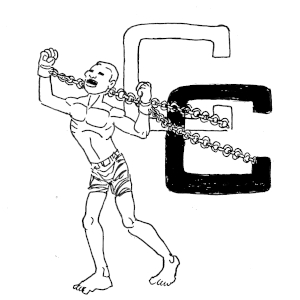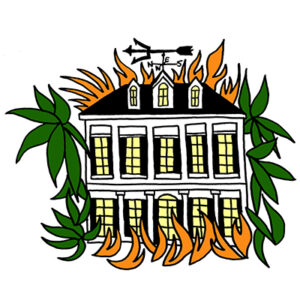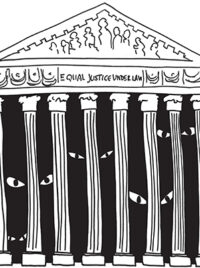The Urgency of Now: Was Democracy Really Useful in the Caribbean?
This article is not the first that has used urgency as the basis of its importance. Like every time before, perhaps I hope that the outcome of the article will somehow add to a commitment of action for a different and better world. With war and political unrest ravaging so much of the world – Palestine, Lebanon, Ayiti, countries in Africa – just to name a few and the ever-present changes in our climate and the ecosystems that sustain our life, it feels like there is a huge existential urgency to find the critical answers. In looking for the answers to the way forward we have to be willing to define things differently and to stop thinking the bare minimum of functioning is acceptable.

Artist: Pedro Camargo
Where do we start with building new ways? How do we get the issues that the majority are concerned about on national agendas? It appears at national and international levels people are powerless to affect political agendas. Democracy has been touted as the best system to create a connection between the ruled and the rulers. Yet increasingly, across the world thousands if not millions of people feel disempowered to have their issues be priorities for leaders. For instance, there have been sustained and substantial marches in solidarity with Palestine and expressed disagreement with the ongoing genocide but the result is that we watch helplessly the continued senseless loss of innocent life. It makes the question, is democracy working in the contemporary moment if it has ever worked at all?
I answer this question from my locus as a Commonwealth Caribbean (CC) citizen. The Islands and territories that make up an archipelago roughly between Jamaica in the North and Guyana on the South American continent is an important but also undermentioned area in the construction of modernity. The CC was the seat of financial might that converted the first world from feudalism to ‘developed societies’. The region’s reward for building the rest of the world is relegation to global south status. The CC and the broader Caribbean region are perpetually placed as an economic extraction zone, underdeveloped and loathsome.
Even as we underline that fact, I think we have been less successful at underlining that the extraction has not stopped at product and wealth. The Caribbean has contributed to the colonizing world through its large Diaspora of people, culture and intellectual traditions. In terms of the intellectual current that drove liberation organizing after the 1930s, the Caribbean- both the Commonwealth Caribbean and the larger littoral – have given a disproportionate number of thinkers – C.L.R James, Frantz Fanon, Aime Cesaire, Walter Rodney. The Caribbean is not a peripheral site in the modernity project – it is the centre.
I therefore believe that contemplating the Caribbean political project, in its current state but also some of the precursors that result in present day outcomes, can be a true test of the usefulness of democracy. In such analysis we can uncover ideological challenges that remain as colonial relics- the bits that stand between us the citizenry and the changes that get us closer to a less patriarchal/hierarchal/ableist/capitalist, exclusionary world. Rinaldo Walcott in The Long Emancipation argues that the legal end of slavery, emancipation, did not result in freedom for the former kidnapped Africans forced into slavery. The 1930s uprising across the CC fueled by the desire of the descendants of kidnapped Africans to have fair wages for work, access to education, clean water and other infrastructure necessary for survival is a tangible example that emancipation was a legal remedy while what the people wanted was justice.
As I noted before the 1930s period offered the intellectual mooring for Black liberation that guided not just the Caribbean but its Diaspora in centres such as Canada, The United States and Britain. The political parties that emerged in the CC were inextricably tied to the labour movement and the desire to create post-colonial societies that were guided by socialist agendas. The socialist agendas were supposed to disrupt the plantocratic patriarchal culture that had embedded itself in the Caribbean as a framework necessary to undergird plantation society. This change i would not have changed the Caribbean alone, it would have left the rest of the world, including the United States of America without the cheap labour of the Caribbean and dependent economies with rich lands and resources that could be appropriated.

Instead of allowing the Caribbean revolutionary process to organically grow and reach conclusion the United States and other first world interests ran interference in the various territories including most notably Grenada, Jamacia and Guyana. The interference was integral to the CC achieving ‘democracy’ when the region ‘gained’ independence throughout the 1960s and 1970s. While at the time the democracy and independence movements seemed to hold all the answers to the questions of unequal distribution of resources, hindsight has given us a vision of how the introduction of democracy in the CC did nothing to disrupt the framework and system of plantation.
Take the current leadership of Barbados. Mia Mottley created a winning campaign in 2018 that incorporated elements which kept the dream of a functioning Caribbean democracy with identity politics to make her bid for the government of Barbados. Shortly after her win she the resorted to what I believe to be one of the most significant and also misunderstood elements of plantation – veneer portrayals. How plantation is understood is and always has been a function of the positionality one held on the plantation.
For people invited to the lavish Great House with its succulent food and cooling Caribbean winds the plantation was a glorious place but for those who lived in squalour and without full personal agency and autonomy – strategically out of the view of the Great House – plantation was hell. Veeneer portrayals also hold valuable lessons about who is seen as human and deserving of having a political system and agenda that serves them and who does not.
Mia Mottley and her leadership of Barbados as a wider metaphor of leadership in the CC is an example of abject failure. When Carole Boyce Davies comes to a different conclusion in her book Black Women’s Rights: Leadership and the Circularities of Power it is because she is interpreting the plantation society of Barbados only from the perspective of the Great House. She has not employed the two hand reading that I suggest is necessary to interpret plantation societies correctly. At the time Boyce Davies was reading the triumph in Mia’s performances on the global stage between 2018 and 2020, Mia Mottley was deafeningly silent about the atrocities being uncovered at the still running government residential school in Barbados which criminalizes minors for needing care and protection.
While Mia Mottley continues to tour the world and presents an image of herself as a progressive feminist leader of the global south (her latest speech being at the UN General assembly September 2024) she has no solutions for the problems causing a majority of users of the national water system to receive discoloured water in the rural parish of St. Lucy, Barbados. Put another way, human rights can be a topic of speechifying for aggrandizement in the Great House/global public but when it comes to ensuring human rights for the masses not connected to the Great House/ordinary citizens of Barbados, nothing happens.
Whichever aspect of failed democracy in the Caribbean we hold up to two hand reading, the conclusion is the same. Democracy is a neoliberal tactic that has protected the interest of plantation, capital and foreign interests in the CC political system. Democracy has not ruptured the frameworks that enabled plantations society – it repackaged them. Specifically in relation to Kamala Harris’ bid for the White House, I think analysis of CC politics and particularly Mia Mottley’s stewardship is instructive.
First of all I do not believe that women should invest in voting for a leader just by virtue of her being a woman. Most women politicians operate in the context of a wider political system that is patriarchal and capitalist. Mia Mottley is a patriarch- women can be patriarchs. When we elect non-male patriarchs what we do is provide the patriarchy with the perfect argument. Women are now equal. They appear in roles of power. The project of equality is complete there is nothing more to achieve. We actually disempower ourselves more as women when we support women patriarchs in seats of power. Women allow themselves to be used when they vote for political figure heads like Mia Mottley who use women and their agenda as a gateway in politics only to then dismiss that very agenda, like fellow patriarchs before them, as trivial and unimportant.
We also put the lives of our children at risk. Capital abhors categories of people that are not seen as useful or productive. These ‘burdens’ can be incarcerated/killed at worst and demonetized at best for maximal return on investment. Again, two-hand reading of Mia Mottley’s political positioning finds her telling the attorney general of Barbados that her major solution to the issue of escalated crime in Barbados is to fine young Black men for having tints on their cars because ‘she wants money’.
Nonpayment of the fines usually result in brushes with the carceral system or at least records that diminish the actualization potential of young men. Again, this is not the message she delivers on the world stage. This is the message for the fringe of society – the message for those who live behind (and away from) the Great House.
Although I focus on Mia Mottley almost exclusively in the examples I offer in this article, Barbados and Mia Mottley are metaphors that can be replaced by St. Vincent and Ralph Gonsalves or Trinidad and Tobago and Keith Rowley or Dominica and Roosevelt Skerrit. While the latter two examples may not see the leaders clamour for space in the international spotlight in the same way as the former two, Great House conversations that do not protect the rights of the masses of the Caribbean are still a feature of democracy everywhere in the CC. Indeed although I focus on the CC, I must mention the mother of Black liberation in the Caribbean, Ayiti where the colonial mechanism and its interference is also clearly seen.
It is not by accident that in most cases outlined above the malfunction of democracy results in figure heads that have been able to thwart first-past-the-post systems to become entrenched oligarchs of the politourgeosie. The longer they stay in power there is a wider gap between them caring about or serving the needs of the citizenry.
Whether we are voting in the upcoming US presidential election or the elections due across the CC archipelago in 2025 and 2026, we should vote with a sense that while democracy continues to serve the interests of the politocracy of the world it is of little use to us the citizenry fighting to protect our livelihoods and climate and reconfigure unequal power relations that cause discrimination and oppression.
Even as we try to figure out next steps toward a political system that works and is effective, the CC becomes important to us its Diaspora living in the first world. We must be in the vanguard of ensuring that the crises, like the water distribution issues in St. Lucy, Barbados, are not blown out of proportion and then used to dispossess Barbadians of their land. We must make sure through our two-hand reading of politics and social situations that we do not create heroes that are not loyal to us and our causes.
We must ensure that we are a part of the educational and resistance processes that are needed to return power and agenda to the global masses. Any where in the world that we have so called democratic systems that uphold the loss of innocent life and the destruction of hope and well being we must call it out as colonialism and capitalism in thinly veiled disguise. We must not allow ourselves to believe that a man-made system that has failed us again and again is the only option to organize and govern ourselves. We must know that while we continue to agitate and move beyond flawed governmental systems that our place is also inside systems made by us for us and where our agenda is the one that drives decisions and actions. We need change now – urgently. I don’t know if we have as much time left ad those who used that as a clarion call in past times.

